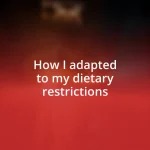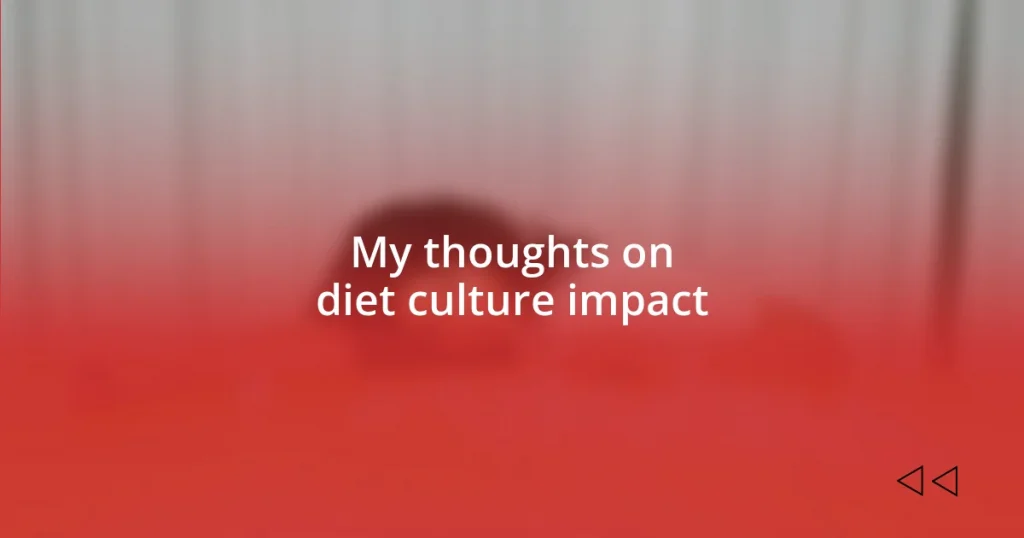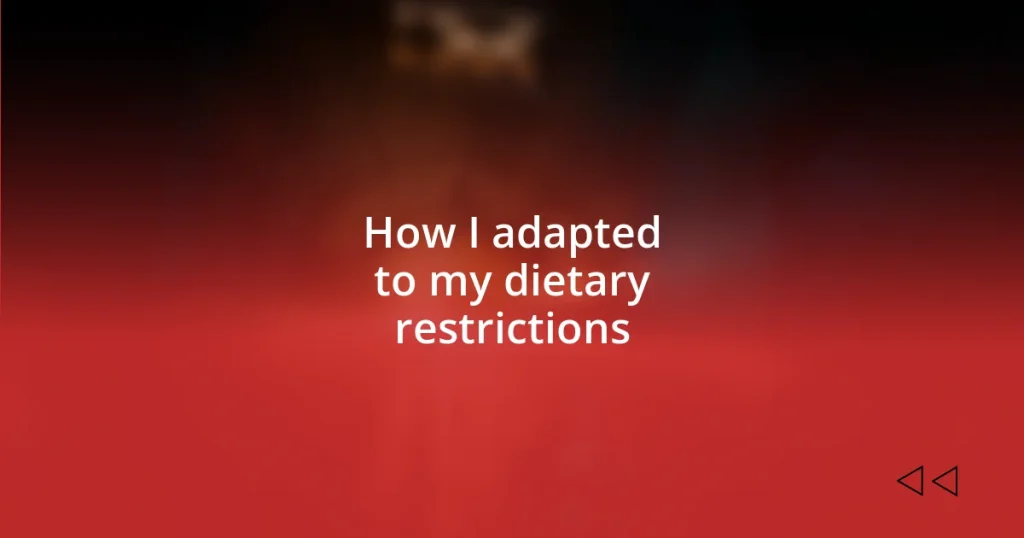Key takeaways:
- Diet culture can negatively impact mental, emotional, and physical well-being, leading to low self-esteem, anxiety, and disordered eating patterns.
- Developing a healthy relationship with food involves shifting the perspective from restriction to nourishment, fostering joy rather than guilt in eating.
- Embracing body positivity and practicing mindfulness in eating can promote sustainable habits and enhance overall well-being.
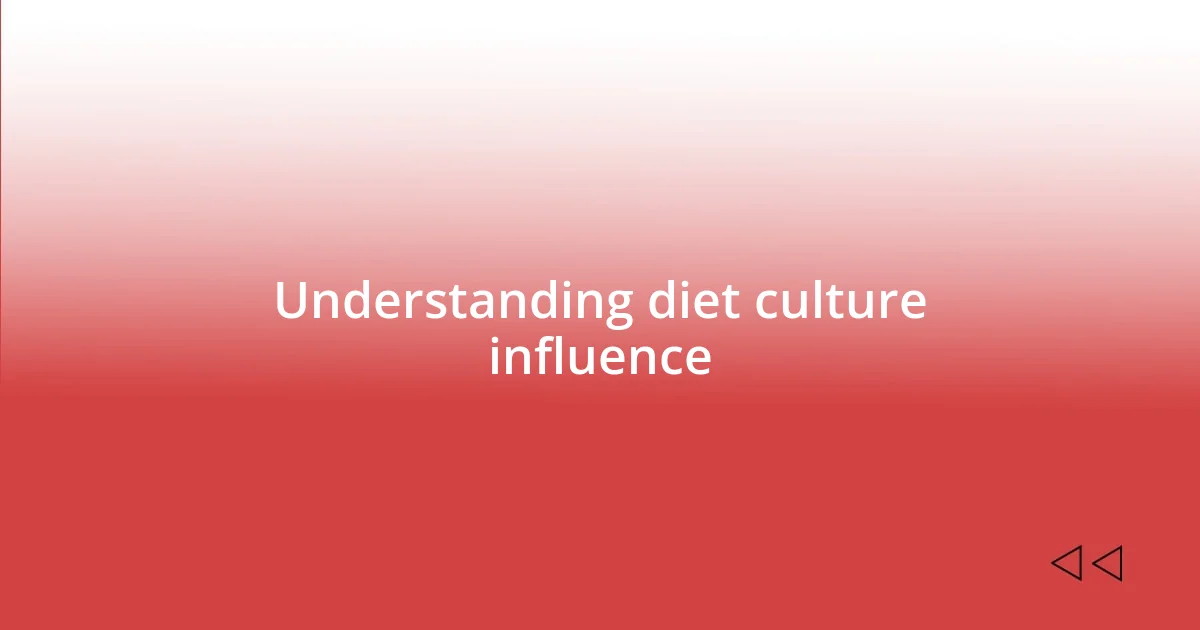
Understanding diet culture influence
Diet culture has a pervasive influence that stretches far beyond food and fitness; it shapes how we view ourselves and our worth. I remember a time when I felt pressured to conform to a certain body ideal, believing that my value depended on it. This realization was unsettling—could it be that many of us are caught in this cycle, chasing an elusive standard rather than embracing our unique selves?
It’s fascinating (and daunting!) how diet culture infiltrates our everyday conversations, often promoting guilt around eating. Have you ever noticed how discussions about food quickly turn into debates about calories or guilt? This constant chatter can really chip away at our self-esteem, leaving us questioning what ‘healthy’ truly means. Personally, I found refuge in shifting my narrative, focusing on nourishment rather than restriction, and it transformed my relationship with food.
Moreover, the role of social media cannot be overlooked; it amplifies diet culture’s messages like never before. Scrolling through perfectly curated feeds, I often felt disheartened, caught in the comparison trap. Why is it that our worth is so often equated with our appearance? By acknowledging these influences, we can begin to redefine our understanding of health and beauty, fostering a more positive self-image that celebrates individuality instead of conformity.
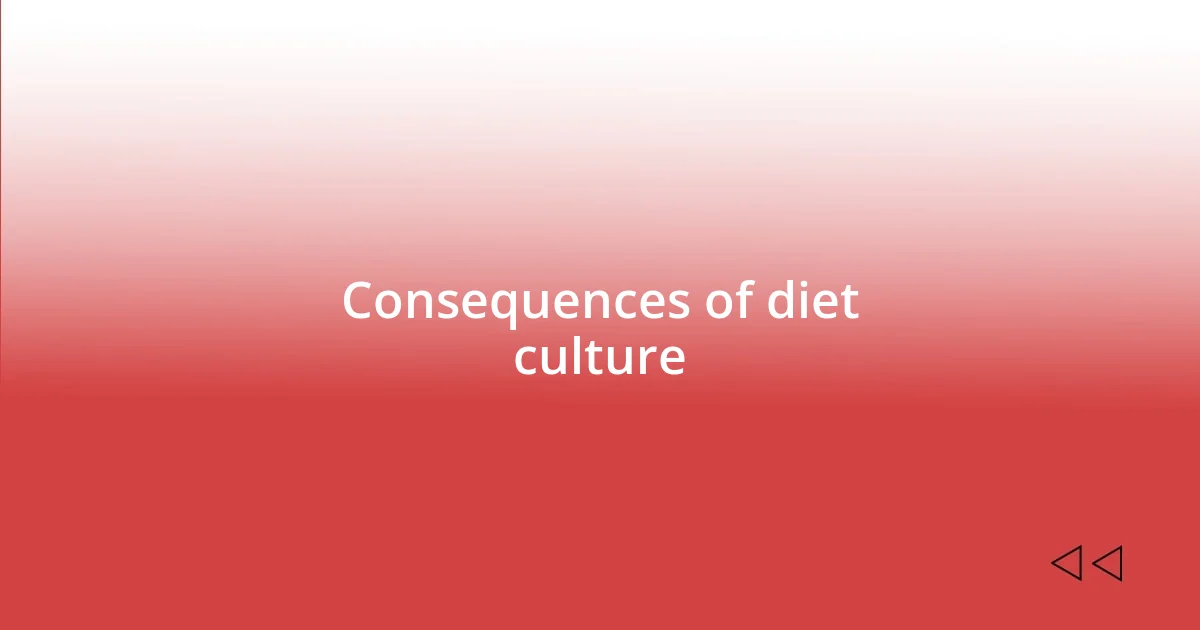
Consequences of diet culture
The consequences of diet culture extend beyond just personal health; they often shape our mental and emotional well-being. I recall a phase in my life when I meticulously counted every calorie, thinking it would lead to happiness. Instead, it created a vortex of anxiety and obsession that made eating a source of dread rather than joy. This relentless push for perfection can lead to a host of negative outcomes, such as:
- Low self-esteem
- Anxiety and depression
- Disordered eating patterns
- Social isolation
- Obsession with body image and weight
On a broader level, the implications of diet culture can muddy our perception of health. It’s perplexing how often I’d find myself prioritizing weight loss over holistic well-being. Engaging in endless diets left me feeling physically drained and emotionally exhausted. This fixation can distort our understanding of what true health means, pushing people toward extreme measures that often do more harm than good. The irony is, in seeking to fit a societal mold, we might lose sight of our own health goals and personal happiness altogether.
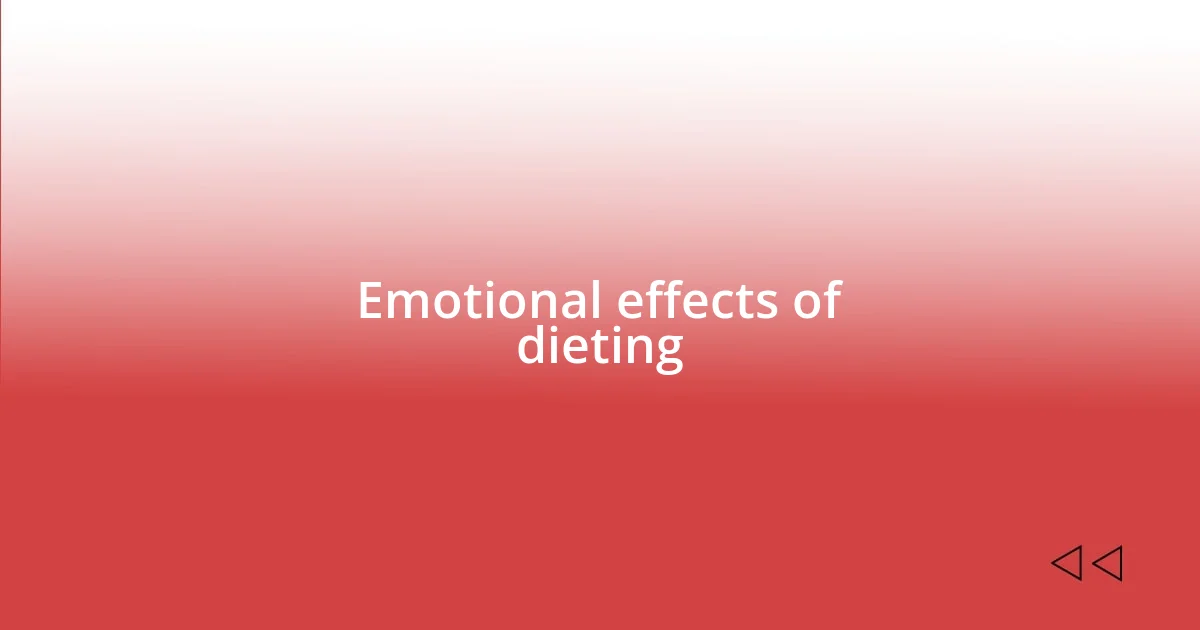
Emotional effects of dieting
The emotional effects of dieting can be profound and far-reaching. I can’t help but recall moments when I felt an overwhelming sense of failure each time I stepped on the scale. It’s as though my worth was directly tied to that number. When I finally made the decision to separate my self-esteem from my weight, it was eye-opening; I discovered that my emotions didn’t have to revolve around food or numbers.
Many people struggle with feelings of guilt or shame around eating, especially during dieting. I remember feeling elated when I would control my portions, yet this would quickly dissolve into anxiety if I indulged in a favorite treat. This back-and-forth emotional rollercoaster can lead to an unhealthy relationship with food, where joy is stripped away and replaced with constant evaluation of choices. Allowing myself to enjoy food has been liberating, though I still grapple with societal expectations every now and then.
Dieting often places individuals in a mindset of deprivation, which can heighten feelings of loneliness. When I avoided certain gatherings for fear of food temptations, it sometimes felt like I was losing out on connections with friends and family. This isolation, fueled by the pressure of dieting, is more devastating than we realize. Recognizing that we can enjoy food without guilt is a journey worth taking for emotional well-being.
| Emotional Effect | Description |
|---|---|
| Low Self-Esteem | Dieting can lead to feelings of worthlessness, especially when expectations aren’t met. |
| Anxiety | Constantly tracking food intake may lead to increased anxiety and stress around eating. |
| Social Isolation | Fear of judgment can limit social interactions, creating a sense of loneliness. |
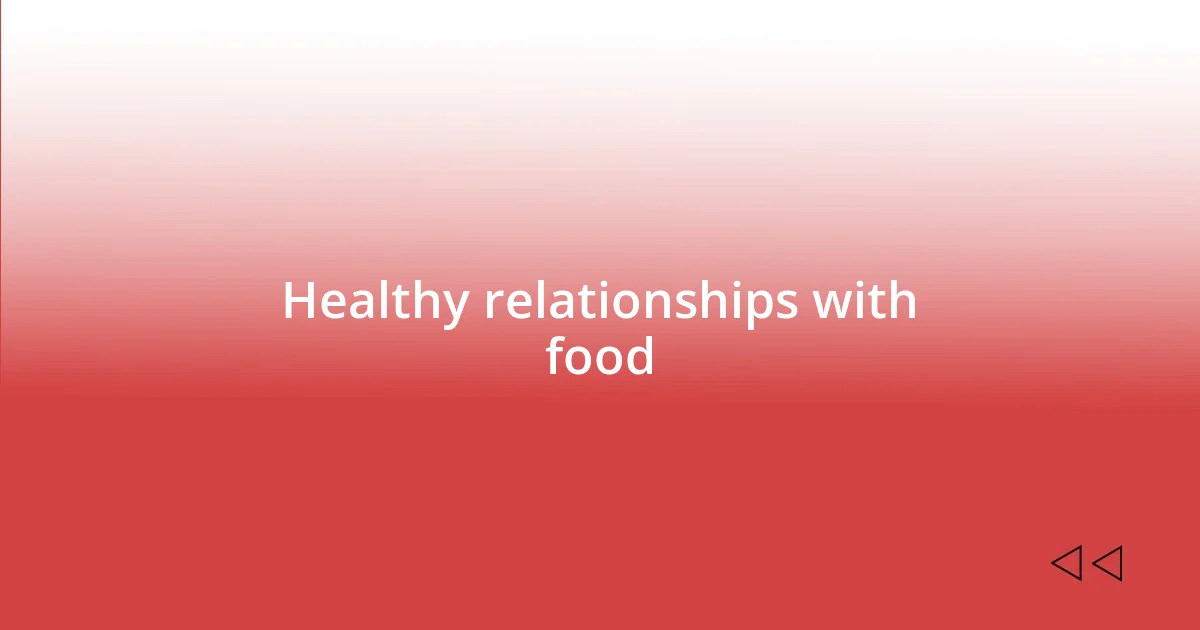
Healthy relationships with food
Nurturing a healthy relationship with food requires a fundamental shift in perspective. I remember the relief I felt when I finally allowed myself to view food as a source of nourishment and enjoyment, rather than punishment. Isn’t it remarkable how such a change can transform meals from a chore into a celebration? Each bite became an opportunity to savor flavors and connect with those around me.
It’s essential to listen to our bodies and honor our hunger cues. Early on, I often ignored my cravings, convinced that every indulgence was a slip-up. Over time, I learned that denying myself only led to greater urges. Have you ever noticed how a little moderation can actually prevent those overwhelming cravings later? Embracing the idea that all foods can fit into a balanced diet has been liberating, fostering appreciation rather than anxiety.
Creating mindful eating habits has also been a game changer in my life. I recall switching off distractions during meals and truly engaging with each dish. The experience is more enriching when we pay attention to textures and tastes. Have you tried this? It allows me to feel gratitude for what I eat, ultimately enhancing both my physical and emotional health. In this light, food isn’t just fuel; it’s a way to nurture not only our bodies but also our souls.
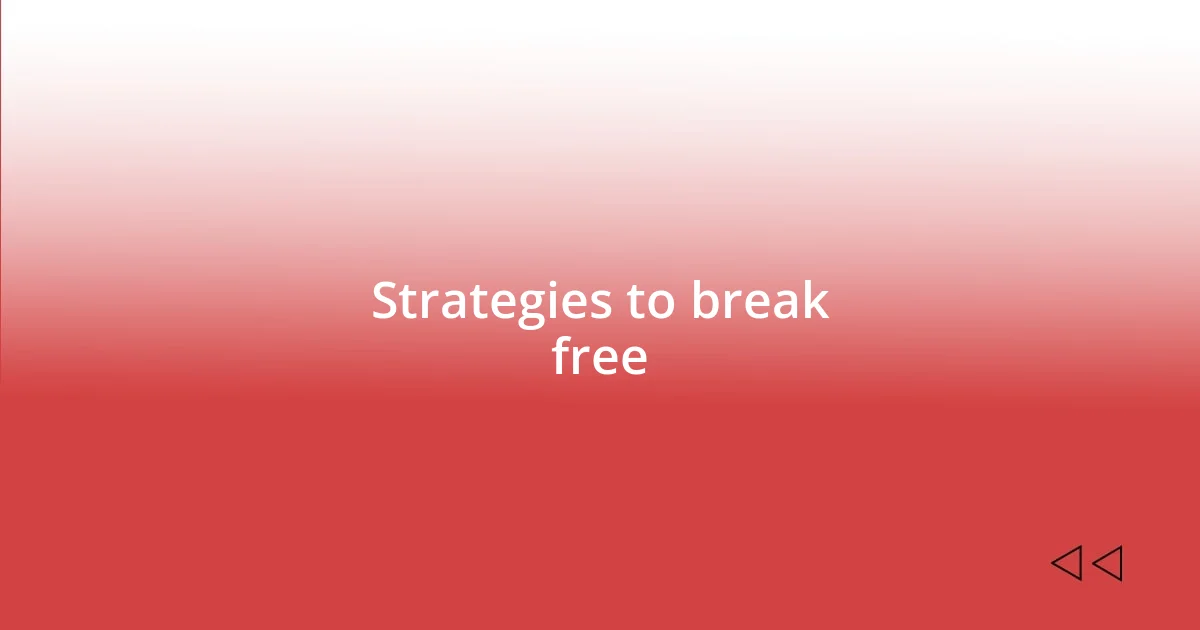
Strategies to break free
To truly break free from diet culture, I’ve found it essential to pinpoint and challenge my own negative beliefs. I remember a time when I thought skipping meals was a badge of honor. Questioning that mindset helped me realize that nourishing my body shouldn’t come with guilt or shame. Have you ever paused to reflect on how much pressure we place on ourselves around food? It can be a real eye-opener to think about how those old beliefs no longer serve us.
Another strategy that really changed my perspective was surrounding myself with body-positive influences. I started following social media accounts that celebrate all body types and encourage intuitive eating. This shift made me feel more accepted and less alone on my journey. When I see others embracing their unique forms, I can’t help but smile. It’s a reminder that our bodies can be beautiful and unapologetically ourselves, allowing joy to flourish rather than frustration.
Lastly, I focused on cultivating a supportive community. Sharing my experiences with friends who understood my struggles was incredibly liberating. We often exchanged stories about our triumphs and setbacks, which made me realize I wasn’t in this alone. Have you considered opening up to someone you trust? Sometimes, just knowing there’s someone in your corner can make all the difference in breaking free from diet culture’s grip.
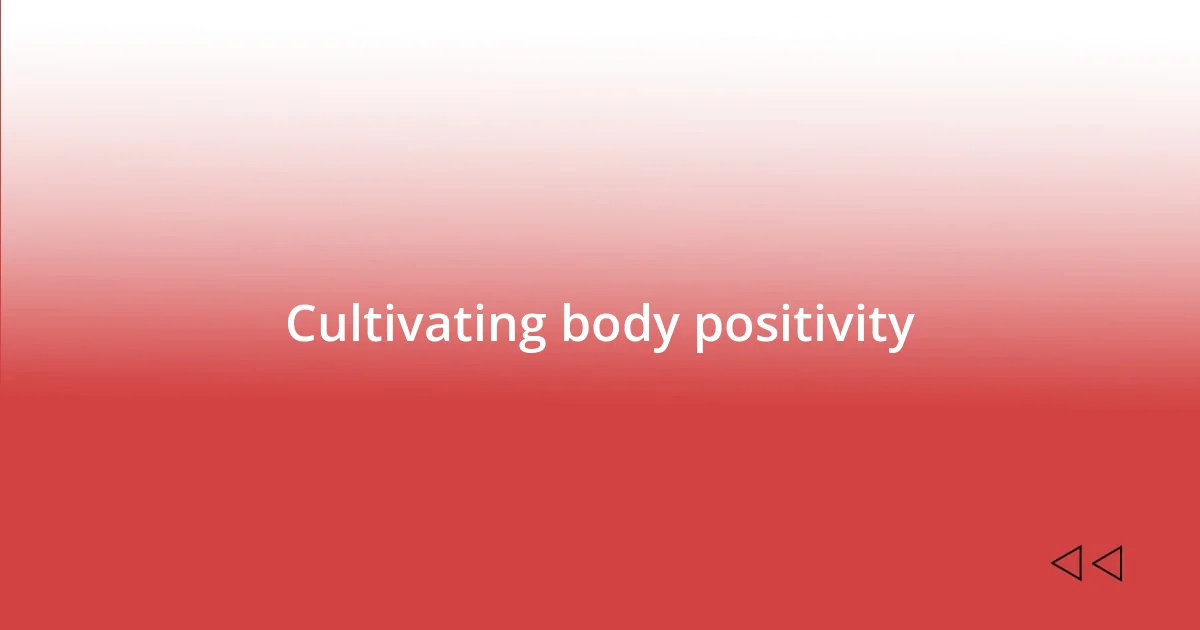
Cultivating body positivity

Cultivating Body Positivity
For me, cultivating body positivity started when I began embracing the little things that made me unique. I recall standing in front of the mirror one morning, appreciating the curves that were once a source of self-doubt. Have you ever experienced that moment of realization when you see beauty in what you previously deemed flaws? It felt liberating to acknowledge my body as it is, rather than what society dictates it should be.
One impactful step was discovering affirmations. I’ve written phrases like “I am enough” on sticky notes and placed them around my space. There’s something powerful about repeating words that validate our worth beyond appearance. It’s funny how a simple phrase can shift our mindset, isn’t it? When I catch a glimpse of those notes, I’m reminded to celebrate myself, not just in looks, but in spirit.
Lastly, I found joy in movement. I used to feel tied down by the idea that exercise had to be a punishment. Instead, I started dancing in my living room, letting go of my inhibitions. Movement became a celebration of life, not a chore. What about you? Have you explored activities that make you feel positive and alive? I believe that when we view our bodies as vessels of joy, rather than objects to critique, we can truly flourish.
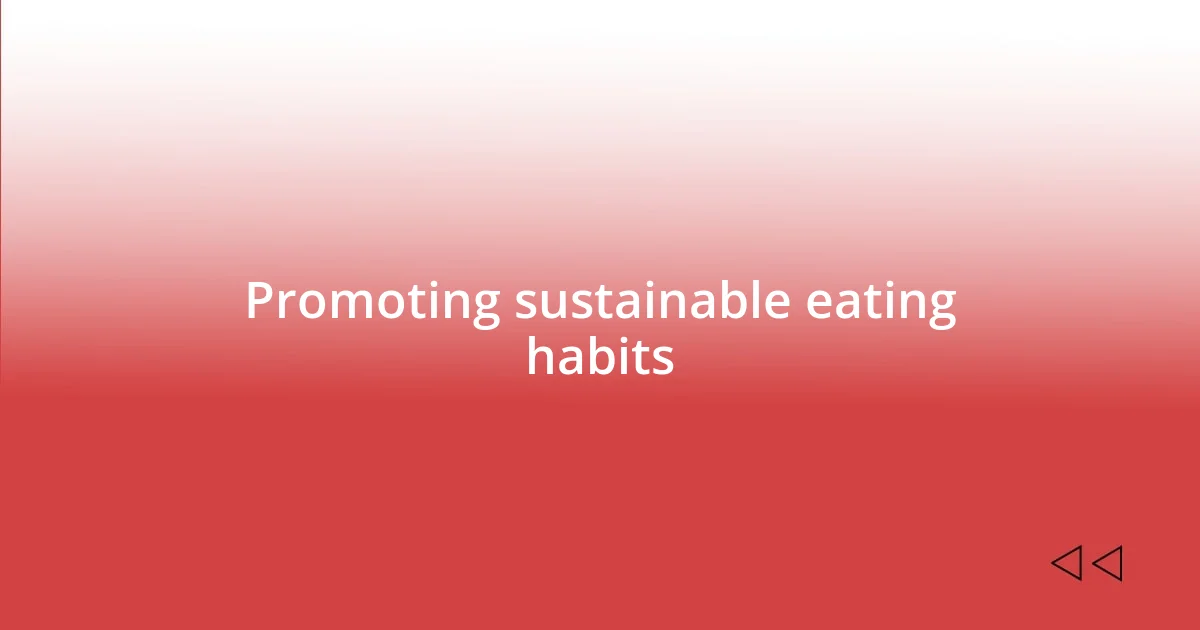
Promoting sustainable eating habits
Promoting sustainable eating habits involves a thoughtful approach to food that respects both our bodies and the planet. I remember transitioning to a more plant-based diet not out of restriction, but from a desire to make a positive environmental impact. It was a journey of discovery, where researching local farms and understanding seasonal produce not only enriched my meals but also deepened my connection to the food ecosystem. Have you ever explored where your food comes from? It’s fascinating to see how our choices can support local economies and reduce our carbon footprint.
Incorporating sustainable practices doesn’t have to feel daunting. I started small by making a conscious effort to reduce food waste in my kitchen. I took some time to learn about preserving and repurposing leftovers, which not only saved me money but also sparked my creativity with cooking. Have you ever turned yesterday’s dinner into a brunch masterpiece? It’s amazing how a little creativity can transform simple ingredients into something delightful while being kind to the environment.
Lastly, mindfulness plays a crucial role in how we approach sustainable eating. I’ve found that tuning into my hunger cues has allowed me to enjoy food more fully and waste less. Instead of eating on autopilot, I take a moment to savor each bite, which leads to a more satisfying experience overall. How often do you check in with yourself before reaching for that snack? This practice has taught me that sustainability isn’t just about what we choose to eat; it’s also about being present and intentional in our eating habits.
